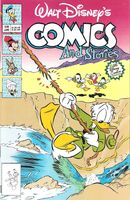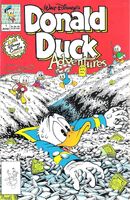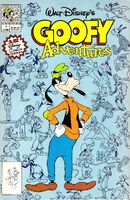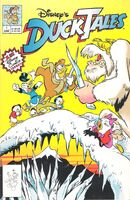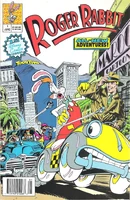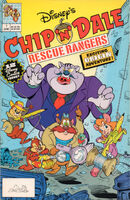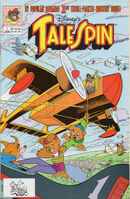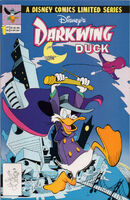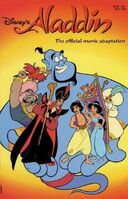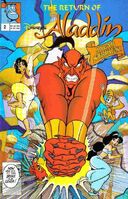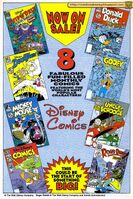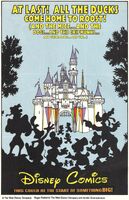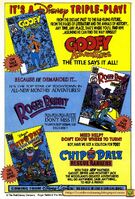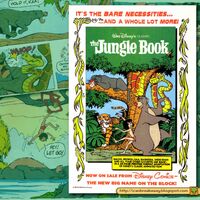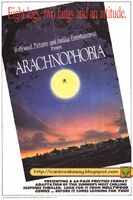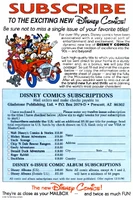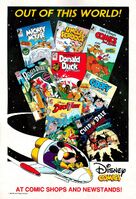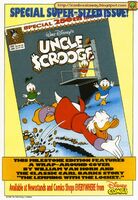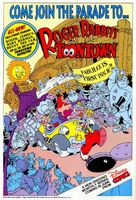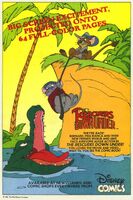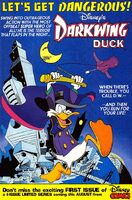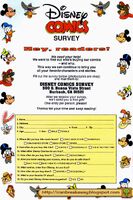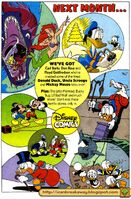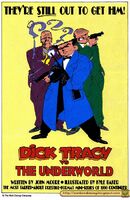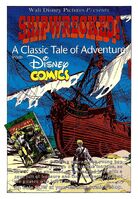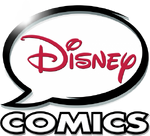No edit summary |
mNo edit summary |
||
| (42 intermediate revisions by 7 users not shown) | |||
| Line 1: | Line 1: | ||
| + | {{Infobox company |
||
| − | [[File:Disney_Comics_logo.png|right|260px]] |
||
| ⚫ | |||
| − | [[File:Disney_Comics_Ad.jpg|thumb|250px|The first print advertisement for Disney Comics.]] |
||
| + | |type=Comic publicity |
||
| ⚫ | |||
| + | |founded= [[1990]] |
||
| + | |defunct= [[1993]] |
||
| + | |keypeople=Len Wein (editor-in-chief)<br>Art Young (editor)<br>Bob Foster (editor)<br>Cris Palomino (editor)<br>David Seidman |
||
| + | |parent=[[The Walt Disney Company]]}} |
||
| + | '''Disney Comics''' was a comic book publishing company operated by [[The Walt Disney Company]] which ran from April [[1990]] to May [[1993]]. It was connected with W. D. Publications, Inc., which was a subsidiary of The Walt Disney Company that published "Disney Comics" during that time span.<ref>{{cite web|url=http://comicbookdb.com/publisher.php?ID=209 |title=W. D. Publications, Inc. |publisher=Comic Book DB |date= }}</ref><ref>{{cite web|url=http://www.comics.org/brand/1916/ |title=GCD :: Brand :: Disney Comics |publisher=Comics.org |date= }}</ref><ref>{{cite web|url=http://www.comics.org/indicia_publisher/524/ |title=GCD :: Indicia Publisher :: W.D. Publications, Inc |publisher=Comics.org |date= }}</ref> W. D. Publications, Inc. created Disney Comics in 1990 so that The Walt Disney Company would not have to rely on outside publishers such as [[Gladstone Publishing]].<ref name=Gerstein>Gerstein, David. [http://www.cartoonresearch.com/gerstein/Back-To-Long-Ago.pdf "Disney Comics: Back to Long Ago!"] ''Comic Book Marketplace'', Vol. 3, no. 103, June 2003, Gemstone Publishing, p. 52.</ref> In the USA, Disney only licensed their comic books to other publishers prior to 1990. |
||
| ⚫ | Following the demise of the Disney Comics line, Disney went back to licensing out their properties to various US comics publishers, while continuing to publish comics in the since-defunct magazines ''[[Disney Adventures]]'' and ''Disney Adventures Comic Zone'', as well as numerous book projects. They eventually reentered the periodical comics market through their 2009 purchase of [[Marvel Entertainment]] (though most Disney comics are instead currently licensed to [[IDW Publishing]] and [[Dark Horse Comics]]). |
||
| − | ==History== |
||
| + | Prior to 1990, the only Disney-published Disney comics were the ones published in Italy, after Disney Italia took over from Mondadori in 1988. |
||
| + | |||
| + | ==Line-up== |
||
===Initial titles=== |
===Initial titles=== |
||
| − | In its first eighteen months, Disney Comics published |
+ | In its first eighteen months, Disney Comics published ten regular monthly titles listed below. With the exception of long-runners ''[[Walt Disney's Comics and Stories]]'' and ''[[Uncle Scrooge]]'', all the existing titles had their issue numbering reset to #1. |
| + | <gallery widths="200" position="center" spacing="small" captionalign="center" bordercolor="transparent"> |
||
| + | WDC&S issue 548.jpg|'''''[[Walt Disney's Comics and Stories]]'''''<br />Issues #548-585<br />(April 1990-May 1993) |
||
| + | UncleScrooge issue 243.jpg|'''''[[Uncle Scrooge]]'''''<br />Issues #243-280<br />(April 1990-May 1993) |
||
| + | Mickey Mouse Adventures 1.jpg|'''''[[Mickey Mouse Adventures#Disney Comics title|Mickey Mouse Adventures]]'''''<br />18 issues<br />(April 1990-September 1991) |
||
| + | DonaldDuckAdventures_DisneyComics_issue_1.jpg|'''''[[Donald Duck Adventures#Disney Comics (1990-1993)|Donald Duck Adventures]]'''''<br />38 issues<br />(April 1990-May 1993) |
||
| + | Goofy adventures.jpg|'''''[[Goofy Adventures]]'''''<br />17 issues<br />(April 1990-August 1991) |
||
| + | DuckTales DisneyComics issue 1.jpg|'''''[[DuckTales (Disney Comics)|DuckTales]]'''''<br />18 issues<br />(April 1990-September 1991) |
||
| ⚫ | |||
| + | CnDRR comic book issue 1.jpg|'''''[[Chip 'n Dale Rescue Rangers (Disney Comics)|Chip 'n Dale Rescue Rangers]]'''''<br />19 issues<br />(April 1990-October 1991) |
||
| + | TaleSpin issue 1.jpg|'''''[[TaleSpin (Disney Comics)|TaleSpin]]'''''<br />7 issues<br />(April–October 1991) |
||
| + | RogerRabbitsToontown issue 1.jpg|'''''[[Roger Rabbit's Toontown]]'''''<br />5 issues<br />(June–October 1991) |
||
| + | </gallery> |
||
| + | In addition to the regular line-up, Disney Comics also published giant-sized seasonal specials during its first two years - ''Autumn Adventures'', ''Holiday Parade'', ''Spring Fever'', and ''Summer Fun''. Only two issues of the first two titles were published, and only one issue was printed for each of the latter two titles. All of these titles would not be published by any other company, with the exception of ''Spring Fever'' being revived by Gemstone Publishing in 2007-2008. |
||
| − | * ''[[Walt Disney's Comics and Stories]]'' (issues #548-585) — continuing series earlier published by [[Dell Comics]] (1940–1962), Gold Key Comics/Whitman (1962–1984), and [[Gladstone Publishing]] (1986–1990) |
||
| − | * ''[[Uncle Scrooge]]'' (issues #243-280) — continuing series earlier published by Dell Comics (1952–1962), Gold Key Comics/Whitman (1962-1984), and Gladstone Publishing (1986-1990) |
||
| − | * ''[[Donald Duck Adventures]]'' (38 issues) |
||
| − | * ''[[DuckTales]]'' (18 issues) |
||
| − | * ''[[Mickey Mouse Adventures]]'' (18 issues) |
||
| − | * ''[[Goofy Adventures]]'' (17 issues) |
||
| ⚫ | |||
| − | * ''[[Chip 'n Dale Rescue Rangers]]'' (19 issues) |
||
| − | * ''[[TaleSpin]]'' (7 issues) |
||
| ⚫ | |||
===Initial collections=== |
===Initial collections=== |
||
| − | Additionally, during the company's first year, eight trade paperbacks called Disney Comics Album |
+ | Additionally, during the company's first year, eight trade paperbacks called Disney Comics Album [sic] were published. These featured older stories, prefaced by opening editorials similar to the earlier Gladstone Comic Album series. |
# Donald Duck and Gyro Gearloose |
# Donald Duck and Gyro Gearloose |
||
# Uncle Scrooge and the Phantom of Notre Duck |
# Uncle Scrooge and the Phantom of Notre Duck |
||
| Line 30: | Line 41: | ||
# Super Goof — The World's Silliest Super-Hero! |
# Super Goof — The World's Silliest Super-Hero! |
||
| ⚫ | |||
| − | Giant-sized seasonal specials included two issues apiece of Autumn Adventures and Holiday Parade, and one issue apiece of Spring Fever and Summer Fun. All of these titles were new to Disney and most were published only by them, with the exception of Spring Fever (revived by Gemstone Publishing in 2007-2008). |
||
| ⚫ | In this period, plans for expansion were announced. At one Comic Con panel, slides of a realistic European barbarian strip were previewed as one of many new titles in development. One planned imprint, '''Vista Comics''', would showcase superheroes, many to be adapted from Disney films such as ''[[Tron]]'' and ''[[The Scarecrow of Romney Marsh]]'', and was being developed by comic book writer and animated TV story-editor Martin Pasko. A second imprint, '''Touchmark Comics''', was actually announced, with former DC Comics editor Art Young at its head. Among the scripts Touchmark acquired was Enigma by Peter Milligan and Sebastian O by Grant Morrison. |
||
| ⚫ | Editor-in-Chief Len Wein's [[Marvel Comics]]-esque approach to the Disney characters was met with criticism by many older Disney fans. The hiring of Wein has been championed by the comic book creative community as an alternative to the much disliked former Marvel Comics Editor-in-Chief Jim Shooter, who had made a favorable impression when interviewed by Disney management.<ref>[http://www.jimshooter.com/2011/09/disney-adventures.html "Disney Adventures"], Jim Shooter's blog</ref> Prior to the launch of the comics division, Disney management proclaimed their intention to quickly become a dominant presence in the comic book market, competing with industry leaders DC and Marvel. |
||
| ⚫ | |||
| ⚫ | In this period, plans for expansion were announced. At one Comic Con panel, slides of a realistic European barbarian strip were previewed as one of many new titles in development. One planned imprint, Vista Comics, would showcase superheroes, many to be adapted from Disney films such as Tron and The Scarecrow of Romney Marsh, and was being developed by comic book writer and animated TV story-editor Martin Pasko. A second imprint, Touchmark Comics, was actually announced, with former DC Comics editor Art Young at its head. Among the scripts Touchmark acquired was Enigma by Peter Milligan and Sebastian O by Grant Morrison. |
||
| ⚫ | These unreasonable expectations, coupled with poor sales, led to a mass cancellation of most of the titles in 1991. Echoing what had been called the DC Implosion of the 1970s, ''Duckburg Times'' editor Dana Gabbard dubbed this "the Disney Implosion". The three titles that featured [[Donald Duck]] as a regular character - ''Walt Disney's Comics and Stories'', ''Uncle Scrooge'', and ''Donald Duck Adventures'' - were the only surviving titles. |
||
| ⚫ | Editor-in-Chief Len Wein's Marvel Comics-esque approach to the Disney characters was |
||
| − | |||
| ⚫ | These unreasonable expectations, coupled with poor sales, led to a mass cancellation in 1991. Echoing what had been called the DC Implosion of the 1970s, Duckburg Times editor Dana Gabbard dubbed this the Disney Implosion.[ |
||
===Remaining titles=== |
===Remaining titles=== |
||
| − | Following the implosion, the three titles continued being published |
+ | Following the implosion, the three Duck-centric titles continued being published alongside the digest ''[[Disney's Colossal Comics Collection]]'' and an occasional mini-series based on a TV show or a movie. These included: |
| + | <gallery widths="200" position="center" spacing="small" captionalign="center" bordercolor="transparent" perrow="3"> |
||
| − | *Darkwing Duck |
||
| + | Darkwing Duck mini-series issue1.jpg|'''''Darkwing Duck'''''<br>4 issues<br />(October 1991-January 1992) |
||
| − | + | TheLittleMermaidIssue1Cover.jpg|'''''[[The Little Mermaid (Disney Comics)|The Little Mermaid]]'''''<br>4 issues<br />(February–May 1992) |
|
| ⚫ | |||
| + | Sebastian_first_issue.jpg|'''''Sebastian'''''<br>2 issues<br />(1992) |
||
| − | *Duck universe |
||
| − | + | 863701.jpg|'''''[[New Adventures of Disney's Beauty and the Beast]]'''''<br>2 issues<br />(1992) |
|
| + | Aladdin_Graphic_Novel.jpg|'''''Disney's Aladdin: The Official Movie Adaptation'''''<br>1 issue<br />(November 1992) |
||
| − | *Dinosaurs |
||
| + | Dinosaurs_-_first_comic_book.jpg|'''''Dinosaurs'''''<br>2 issues<br />(December 1992-February 1993) |
||
| − | *Aladdin |
||
| + | The Return of Disney's Aladdin 02.jpg|'''''The Return of Aladdin'''''<br>2 issues<br />(1993) |
||
| + | </gallery> |
||
| − | All plans for expansion, however, were cancelled. Editor Art Young moved back to DC, and many of the unpublished Touchmark titles were published as part of its new Vertigo imprint. |
+ | All plans for expansion, however, were cancelled. Editor Art Young moved back to DC, and many of the unpublished Touchmark titles were published as part of its new Vertigo imprint. Wein left and Marv Wolfman concentrated on being comics editor of Disney Adventures. In a mini-renaissance, editors Bob Foster, Cris Palomino, and David Seidman brought an appreciation of the classic Disney characters to the three continuing titles. Foster especially after a lifetime of involvement with Disney comic books and strips specialized in reprinting rarities even seasoned fans were unaware of. The Disney Studio finally decided to shut down its comic book publishing division in 1993. |
==Licenses== |
==Licenses== |
||
| ⚫ | While Disney covered regular publication of their comics staring in 1990, Gladstone Publishing, the previous holder of the license, was granted a new license to publish a series of softcover albums aimed at the collectors market, reprinting the stories of [[Carl Barks]] in color. After Disney Comics shut down in 1993, Gladstone regained the regular comics license for the classic Disney characters, which they resumed publishing until 1998, while [[Marvel Comics]] obtained the license for the modern Disney characters in [[1994]] and published them until they were forced to file for bankruptcy in December 1996 and sold their rights to Acclaim in 1997. ''Gargoyles'' and ''Tron'' were licensed to Slave Labor Graphics in the 2000s, while Dark Horse Comics published a few comic adaptations of Disney movies from 1999 to 2004. In 2003, Gladstone reformed as Gemstone Publishing and once more published comics with the classic characters until 2008. From 2009 to 2011, [[Boom! Studios]] held the license for the classic cartoon characters for both new and reprint material, along with new material licenses for various Pixar and Muppet projects (which were later moved to Marvel). Checker Publishing Group holds reprint licenses on comics material that Disney purchased from Crossgen. As of [[2017]], the comic license for the ''Mickey Mouse'', ''Donald Duck'', and ''Silly Symphonies'' characters, along with ''[[Tangled]]'', the 2017 ''[[DuckTales (2017 series)|DuckTales]]'', and the ''[[The Disney Afternoon]]'' titles<ref>https://www.bleedingcool.com/2018/07/25/idw-october-solicitations-2018-disney-afternoon-giant-darth-vader-castle-star-wars/</ref> is held by [[IDW Publishing]], while all of Disney's other animated properties have been licensed to [[Dark Horse Comics]]. |
||
| + | |||
| + | ==Print advertisements== |
||
| + | <gallery widths="200" spacing="small" position="center" captionalign="center"> |
||
| + | DC-FirstMonth.jpg|A print ad showing off Disney Comics' initial line-up |
||
| + | Disney_Comics_Ad.jpg|"At last! The Ducks have come home to roost!" (April 1990) |
||
| + | DCTriplePlay.jpg|"It's a Disney Triple-Play!" (April 1990) |
||
| + | DC-ComicAlbums.jpg|''Disney Comic Album''s #3 & 4 (June 1990) |
||
| + | JungleBook.jpg|''The Jungle Book'' Graphic Novel (1990) |
||
| + | DC-ArachnophobiaAd.jpg|''Arachnophobia'' Graphic Novel (September 1990) |
||
| + | DC-Subscription.jpg|This subscription form appeared midway through the imprint's first year |
||
| + | DC-July1990Ad.jpg|"Out of This World!" (July 1990) |
||
| + | DC-US250ad.jpg|''Uncle Scrooge'' #250 (November 1990) |
||
| ⚫ | |||
| + | DC-RescuersAd.jpg|''The Rescuers Down Under'' Graphic Novel (August 1991) |
||
| + | DC-DarkwingPreview.jpg|''Darkwing Duck'' #1 (August 1991) |
||
| + | DC-Survey.jpg|Disney Comics survey (September 1991) |
||
| + | DC-Classics.jpg|This ad showed off the now-downsized Disney Comics output. (December 1991) |
||
| + | DC-VintageArtists.jpg|''Walt Disney's Comics and Stories'' #571 (January 1992) |
||
| + | DCDickTracyUnderworld.jpg |
||
| + | DC-WhiteFang.jpg |
||
| + | DC-Shipwrecked.jpg |
||
| + | DC-DinosaursAd.jpg |
||
| + | DC-BeautyBeastLtd.jpg |
||
| + | </gallery> |
||
| + | |||
| + | ==References== |
||
| + | {{reflist}} |
||
| + | |||
| + | ==External links== |
||
| + | *[http://coa.inducks.org/publisher.php?c=Disney Disney Comics] at the [[INDUCKS]] |
||
| + | {{Wikipedia}} |
||
| ⚫ | |||
| + | {{Disney comics}} |
||
[[Category:Walt Disney Company subsidiaries]] |
[[Category:Walt Disney Company subsidiaries]] |
||
[[Category:Publishers]] |
[[Category:Publishers]] |
||
Revision as of 07:21, 16 May 2020
Disney Comics was a comic book publishing company operated by The Walt Disney Company which ran from April 1990 to May 1993. It was connected with W. D. Publications, Inc., which was a subsidiary of The Walt Disney Company that published "Disney Comics" during that time span.[1][2][3] W. D. Publications, Inc. created Disney Comics in 1990 so that The Walt Disney Company would not have to rely on outside publishers such as Gladstone Publishing.[4] In the USA, Disney only licensed their comic books to other publishers prior to 1990.
Following the demise of the Disney Comics line, Disney went back to licensing out their properties to various US comics publishers, while continuing to publish comics in the since-defunct magazines Disney Adventures and Disney Adventures Comic Zone, as well as numerous book projects. They eventually reentered the periodical comics market through their 2009 purchase of Marvel Entertainment (though most Disney comics are instead currently licensed to IDW Publishing and Dark Horse Comics).
Prior to 1990, the only Disney-published Disney comics were the ones published in Italy, after Disney Italia took over from Mondadori in 1988.
Line-up
Initial titles
In its first eighteen months, Disney Comics published ten regular monthly titles listed below. With the exception of long-runners Walt Disney's Comics and Stories and Uncle Scrooge, all the existing titles had their issue numbering reset to #1.
In addition to the regular line-up, Disney Comics also published giant-sized seasonal specials during its first two years - Autumn Adventures, Holiday Parade, Spring Fever, and Summer Fun. Only two issues of the first two titles were published, and only one issue was printed for each of the latter two titles. All of these titles would not be published by any other company, with the exception of Spring Fever being revived by Gemstone Publishing in 2007-2008.
Initial collections
Additionally, during the company's first year, eight trade paperbacks called Disney Comics Album [sic] were published. These featured older stories, prefaced by opening editorials similar to the earlier Gladstone Comic Album series.
- Donald Duck and Gyro Gearloose
- Uncle Scrooge and the Phantom of Notre Duck
- Donald Duck in Dangerous Disguise
- Mickey Mouse Outwits the Phantom Blot
- Chip 'n Dale Rescue Rangers: The Secret Casebook
- Uncle Scrooge in Tralla-La
- Donald Duck in Too Many Pets!
- Super Goof — The World's Silliest Super-Hero!
Planned expansion and implosion
In this period, plans for expansion were announced. At one Comic Con panel, slides of a realistic European barbarian strip were previewed as one of many new titles in development. One planned imprint, Vista Comics, would showcase superheroes, many to be adapted from Disney films such as Tron and The Scarecrow of Romney Marsh, and was being developed by comic book writer and animated TV story-editor Martin Pasko. A second imprint, Touchmark Comics, was actually announced, with former DC Comics editor Art Young at its head. Among the scripts Touchmark acquired was Enigma by Peter Milligan and Sebastian O by Grant Morrison.
Editor-in-Chief Len Wein's Marvel Comics-esque approach to the Disney characters was met with criticism by many older Disney fans. The hiring of Wein has been championed by the comic book creative community as an alternative to the much disliked former Marvel Comics Editor-in-Chief Jim Shooter, who had made a favorable impression when interviewed by Disney management.[5] Prior to the launch of the comics division, Disney management proclaimed their intention to quickly become a dominant presence in the comic book market, competing with industry leaders DC and Marvel.
These unreasonable expectations, coupled with poor sales, led to a mass cancellation of most of the titles in 1991. Echoing what had been called the DC Implosion of the 1970s, Duckburg Times editor Dana Gabbard dubbed this "the Disney Implosion". The three titles that featured Donald Duck as a regular character - Walt Disney's Comics and Stories, Uncle Scrooge, and Donald Duck Adventures - were the only surviving titles.
Remaining titles
Following the implosion, the three Duck-centric titles continued being published alongside the digest Disney's Colossal Comics Collection and an occasional mini-series based on a TV show or a movie. These included:
All plans for expansion, however, were cancelled. Editor Art Young moved back to DC, and many of the unpublished Touchmark titles were published as part of its new Vertigo imprint. Wein left and Marv Wolfman concentrated on being comics editor of Disney Adventures. In a mini-renaissance, editors Bob Foster, Cris Palomino, and David Seidman brought an appreciation of the classic Disney characters to the three continuing titles. Foster especially after a lifetime of involvement with Disney comic books and strips specialized in reprinting rarities even seasoned fans were unaware of. The Disney Studio finally decided to shut down its comic book publishing division in 1993.
Licenses
While Disney covered regular publication of their comics staring in 1990, Gladstone Publishing, the previous holder of the license, was granted a new license to publish a series of softcover albums aimed at the collectors market, reprinting the stories of Carl Barks in color. After Disney Comics shut down in 1993, Gladstone regained the regular comics license for the classic Disney characters, which they resumed publishing until 1998, while Marvel Comics obtained the license for the modern Disney characters in 1994 and published them until they were forced to file for bankruptcy in December 1996 and sold their rights to Acclaim in 1997. Gargoyles and Tron were licensed to Slave Labor Graphics in the 2000s, while Dark Horse Comics published a few comic adaptations of Disney movies from 1999 to 2004. In 2003, Gladstone reformed as Gemstone Publishing and once more published comics with the classic characters until 2008. From 2009 to 2011, Boom! Studios held the license for the classic cartoon characters for both new and reprint material, along with new material licenses for various Pixar and Muppet projects (which were later moved to Marvel). Checker Publishing Group holds reprint licenses on comics material that Disney purchased from Crossgen. As of 2017, the comic license for the Mickey Mouse, Donald Duck, and Silly Symphonies characters, along with Tangled, the 2017 DuckTales, and the The Disney Afternoon titles[6] is held by IDW Publishing, while all of Disney's other animated properties have been licensed to Dark Horse Comics.
Print advertisements
References
- ↑ "W. D. Publications, Inc.". Comic Book DB.
- ↑ "GCD :: Brand :: Disney Comics". Comics.org.
- ↑ "GCD :: Indicia Publisher :: W.D. Publications, Inc". Comics.org.
- ↑ Gerstein, David. "Disney Comics: Back to Long Ago!" Comic Book Marketplace, Vol. 3, no. 103, June 2003, Gemstone Publishing, p. 52.
- ↑ "Disney Adventures", Jim Shooter's blog
- ↑ https://www.bleedingcool.com/2018/07/25/idw-october-solicitations-2018-disney-afternoon-giant-darth-vader-castle-star-wars/
External links
- Disney Comics at the INDUCKS
| This page uses content from the English Wikipedia page Disney Comics. The list of authors can be seen in the page history. Text from Wikipedia is available under the Creative Commons Attribution-ShareAlike License; additional terms may apply. |

